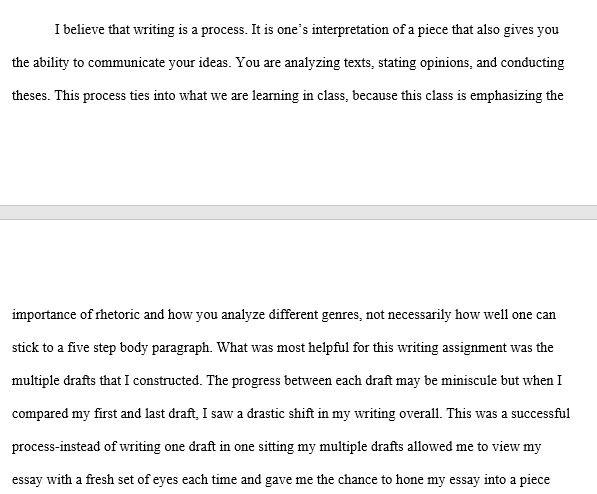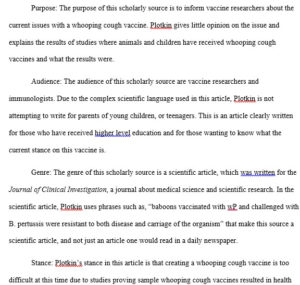I’m sitting in my doctor’s office, clothes back on my body after my physical exam. The nurse walks in with the tray. I can’t look away, not when there’s a needle and a band aid just sitting there, waiting to be used. My heart begins to pound quicker as I roll my sleeve up my arm. The nurse wipes my arm, and I take a deep breath. I’m not afraid of shots per se, but who actually likes them? As I’ve aged and the vaccinations continue, I don’t curl into a ball or leave the doctor’s office crying anymore. There’s still a process, but the process itself has changed. When I began this class, I believed that writing was a process and I still do 16 weeks later. However, my idea of the process itself has changed. Now, I believe that process requires multiple drafts and a fearless voice. My theory of writing has grown with me throughout the progression of this course.
When I began this class, I didn’t really have a “theory” in mind for writing. When I had an assignment due, I would sit down and write the entire essay from the introduction to the conclusion. If I had more than one draft before the final draft of the essay was completed, it was because a teacher required us to submit proof of multiple drafts. I didn’t think about the writing process. Sure, I knew good writing had transitions, a hook, and a developed thesis that was prevalent throughout the essay but I never paid attention to an essay’s rhetorical situation. Before this class, my “so what” for an essay was “I’m writing this essay because I am required to”. Looking back at the first reflection that I wrote for this class, one can tell I am just regurgitating words I heard spoken in class.

Of course, writing is a process! While I still believe what I wrote above, it is what I consider the first draft of my theory of writing.
This course revealed how broad genres can be. In August, the only genres that I knew of were fiction, nonfiction, biography, and poetry. Now, I know a genre can range from a political cartoon to a post on Twitter. The first essay I wrote for this class was written in a list format, where I simply explained each rhetorical aspect of my four sources. The genre resulted in an essay that was organized and simple to follow and understand the purpose. Before this class, I never knew an essay could be so informal as I had always thought every essay had to be in a five step body paragraph format. Understanding not only the rhetorical situation, but aspects of rhetorical analysis as well has improved my writing just like how writing multiple drafts improves my writing.

When I write now, I consider my audience and rhetorical situation. I am specific about who my audience is as they are, in the words of Professor Harris, “who is going to actually read your work?” Audience is no longer merely “adults”. I attempt to have my writing speak its purpose through my stance, instead of having the essay read like a forced prompt. Back in high school, I was always careful to write essays that were not controversial. I was afraid of a teacher harshly grading me due to a difference in opinion. After looking at multiple rubrics, I realize this is not the case, for I am only graded on my ability to analyze and support my opinion not my opinion itself. This is why stance is an important part of my theory of writing. Every piece of writing has a stance, even the research articles that discuss the molecular structure of an atom. After writing the inquiry based research essay, I allowed my attitude and voice to echo throughout my essays.

My opinion in this essay is clearly stated and my claim is supported with credible evidence. I allow my own voice to be heard in my essays when appropriate, and I always make sure any essay has a stance regardless of the genre. This essay demonstrates my improvement on allowing my voice to flow in an essay.
This semester I was taking a FIQWS class in addition to this composition course. Thus, I was taking two courses about writing. Both have influenced a shift in my writing from high school to now in college. The multiple drafts, the acknowledging of the rhetorical situation and stance, and peer reviews have influenced this now developed theory of writing. The ability to read other student’s papers and notice the differences and similarities to my own paper is astonishing. Having someone else read my essay is the only true improvement that I can receive before my essay is graded. In addition, the private conferences with my professor was something that I had never done before this class. This new experience was immensely appreciated because I realized portions of my essay was confusing, I was citing incorrectly, or I needed to expand on an idea. The peer reviews and individual conferences for both courses allow me to contribute to my theory of writing the idea of revision. Writing is a lengthy process that cannot be rushed.
As a psychology major, this class will support my writings in the future. I will need to write lengthy research papers similar to my inquiry-based essay, I will need to have my audience and stance in mind when analyzing a study, and I will need to explore my rhetorical situation in numerous papers about new findings in research. I will explore new genres that fit my style of writing best. Just like the research itself, the write up will take multiple drafts. I may need to throw out a paper and completely start over, adding on to the revision process. Even if my write up is of analyzing data that is objective, there will be a stance. With this theory of writing, my writing will continue to improve in the next four years at CCNY through my drafts, acknowledged audience, unwavering stance, and acceptance of the fact that writing is a process. As long as I am trying my best, I cannot fail.



